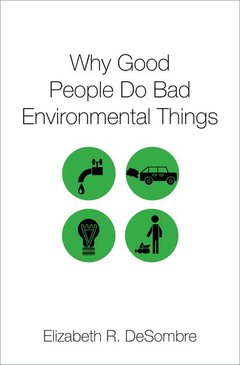Why Good People Do Bad Environmental Things
Langue : Anglais
Auteur : DeSombre Elizabeth R.

No one sets out to intentionally cause environmental problems. All things being equal, we are happy to protect environmental resources; in fact, we tend to prefer our air cleaner and our species protected. But despite not wanting to create environmental problems, we all do so regularly in the course of living our everyday lives. Why do we behave in ways that cause environmental harm? It is often easy and inexpensive to behave in ways with bad environmental consequences, but more difficult and costly to take environmentally friendly actions. The incentives we face, some created by the nature of environmental resources, some by social and political structures, often do not make environmentally beneficial behavior the most likely choice. Furthermore, our behavior is conditioned by habits and social norms that fail to take environmental protection into consideration. In this book, Elizabeth R. DeSombre integrates research from political science, sociology, psychology, and economics to understand why bad environmental behavior makes perfect sense. As she notes, there is little evidence that having more information about environmental problems or the way an individual's actions contribute to them changes behavior in meaningful ways, and lack of information is rarely the underlying cause that connects behavior to harm. In some cases such knowledge may even backfire, as people come to see themselves as powerless to address huge global problems and respond by pushing these issues out of their minds. The fact that causing environmental problems is never anyone's primary goal means that people are happy to stop causing them if the alternative behavior still accomplishes their underlying goals. If we can figure out why those problems are caused, when no one intends to cause them, we can develop strategies that work to shift behavior in a positive direction. Over the course of this book, DeSombre considers the role of structure, incentives, information, habit, and norms on behavior in order to formulate lessons about how these factors lead to environmentally problematic behavior, and what understanding their effects can tell us about ways to change behavior. To prevent or address environmental problems, we have to understand why even good people do bad environmental things.
Elizabeth R. DeSombre is the Camilla Chandler Frost Professor of Environmental Studies at Wellesley College, where she directs the Environmental Studies Program. Her background is in international environmental law (with a particular focus on oceans) and United States environmental policy. She has written seven books and won two book prizes. She is also a touring folk singer-songwriter and has recorded four CDs.
Date de parution : 09-2020
Ouvrage de 266 p.
23.1x15 cm
Date de parution : 06-2018
Ouvrage de 264 p.
23.6x15.7 cm
Thèmes de Why Good People Do Bad Environmental Things :
© 2024 LAVOISIER S.A.S.


